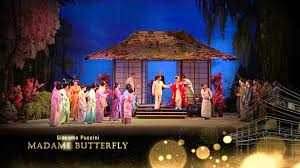White Rock Theatre, 30 January 2018
The great strength of Ellen Kent’s touring production of Puccini’s Madama Butterfly is its simplicity. Where recent presentations have highlighted the problems of child marriage – she is after all only fifteen in act one – and the more pressing importance of American Imperialism, this production concentrates on story-telling and the development of character, a potential strength when many of the audience may be encountering the opera for the first time.
The initial visual impact is of an idealised, almost fairy-tale, Japan, with bright colours and everything clean, crisp and new, and this does not change, though the second act is at least three years later. Consequently we are caught in a timeless Japan within which the events unfold, concentrating on the tragic implications of a thoughtless young American. Giorgio Meladze cuts a strong figure as B F Pinkerton. His singing was well focussed throughout and he makes much of Amore o grillo and Dovunque al mondo, bringing a brashness to his admission that he will marry Butterfly today but will get a real wife when he gets back to America. That his singing of addio fiorito asil in act two is far more hesitant and reflective gave a sense of genuine remorse for a situation now totally beyond his control. That he was booed at the end (very much tongue-in-cheek from an audience who obviously enjoyed his performance) because of his caddish behaviour, was a tribute to his acting.
Maria HeeJung Kim brought a naivety to Cio-Cio-San which was gently convincing in act one. Her oriental gestures helped to create an obvious disparity between herself and Pinkerton, and one which even love would find difficult to conquer. Their passionate duet at the end of act one was all the more impressive for the lack of physical contact. This was as much an emotional overwhelming as a physical one. Her strength came through in act two with a finely sung Un bel di and a moving relationship with her son, making her suicide inevitable and noble.
There was nothing her maid Suzuki, sensitively sung by Zara Vardanean, could have done to prevent the outcome; however Iurie Gisca’s, Sharpless must take some of the blame as his warnings were off-hand and his inability to read the letter reflected his own embarrassment rather than the reality of the situation.
Other parts were well sung with Vadym Chernihovskyi visually impressive as Yamadori. It made even less sense that Butterfly would not marry him under the circumstances. The small orchestra under Vasyl Vasylenko provided solid support, with the harp particularly impressive.
There was a greater problem with the chorus. Though they sang well they looked as if they had just walked in from a production of The Mikado and were very much at odds with the rest of the cast.
As a way to learn, and encourage others to enjoy, opera for the first time, Ellen Kent’s productions have much to offer.
The company return to the White Rock Theatre on 29th April with Verdi’s La Traviata.

